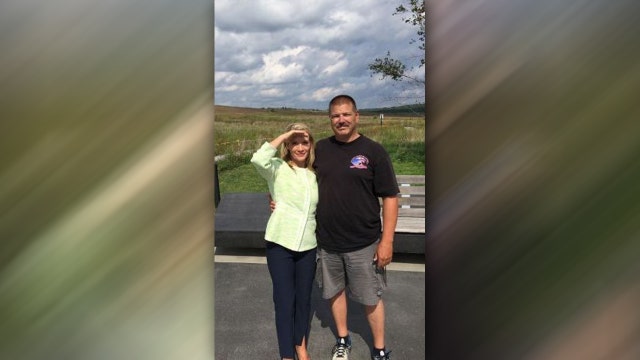15 years later: Dana Perino talks to 9/11 family member
Kenny Nacke remembers his brother Louis, who died on Flight 93
Flying to Pittsburgh Thursday morning, I rested my head on the scratchy airline pillow and closed my eyes. It was an early flight after a late night, and I could have used another hour’s sleep, yet I couldn't rest.
Every time I closed my eyes, I pictured what the passengers and crew of Flight 93 went through fifteen years ago on September 11th. I imagined a flight much like the one I was on -- quiet, routine, some passengers reading, some working on their laptops until the very last second before the cabin door closes.
None of them suspecting that they would die in an hour.
I have a fascination with Flight 93. My emotions are mixed: awe; gratitude; fear; heartache; pride; even, in some ways, guilt.
In all the years I worked at the White House, my schedule never coincided with a trip to the memorial site. An assignment for "The Five" on Fox News Channel changed that for me this year.
The Flight 93 Memorial isn’t that easy to get to. It isn’t like the memorials in New York City or Washington, D.C., where you may go on a business trip or family vacation. No, in order to get to Shanksville, PA, you fly to Pittsburgh, make your way through the traffic and onto the highway that takes you through the beautiful wooded countryside.
As you drive up the road to the site, you see Americana at its finest -- the local diner, the auto repair shop, the Rotary club, the schoolhouse. And everywhere, American flags.
It is quiet. A nice place to raise a family. The locals certainly never expected to be home to the site of the first battle won in the war on terror, but they do it with great care and are proud to do so.
I encourage everyone to make the trip. It is important. And it is worth it.
The memorial starts off on the flight path. As you walk, you can see markings of the planes plowing into the Twin Towers. And then, huddled in the back of Flight 93, the passengers learn of the plane that hit the Pentagon. And they realized that the hijackers were lying to them -- they weren’t going back to an airport.
In just minutes, these passengers accepted their duty and made a plan. In an act of defiance against the terrorists who hated their way of life, the passengers held a vote (I love to imagine what that was like).
They decided to try to wrest back control of the plane instead of being used as a weapon against their own people. In those next few minutes, several passengers made phone calls to loved ones; three of those calls were recorded, and you can listen to them at the visitors’ center at the memorial.
I braced myself when I picked up the handset. They sounded so calm -- their worries not for themselves, but rather for the loved ones they believed they may never see again.
Go listen to those calls to better understand the story. Let yourself cry. It helps.
After the calls, the passengers come together in prayer. Bounded by their faith and their patriotism, they defied the terrorists and ultimately lost their lives. But they saved countless others.
Experts believe the plane was headed to the U.S. Capitol, where I first worked after graduate school and many of my friends still worked there at the time. Still do, actually.
I love that building and lived near it for many years. It is the symbol of freedom and democracy for people all over the world.
At the impact site, I spoke to Kenny Nacke whose brother Louis died on the flight. Louis would have been 57 on Friday, September 9.
Kenny is a Baltimore City police officer -- a strong man with a killer handshake that left me shaking my hand for about an hour after we met. But when we spoke of his brother, he let down his tough exterior and showed me the raw grief that he still walks with every day.
Before the interview, he told me he’d be fine, that he’d shed his last tear. Within two minutes, he and I were holding each other up and could barely speak.
The victims of the other three flights had no chance to fight back because they didn’t know what was happening.
The passengers of Flight 93 barely had time to process the news, but they acted swiftly. They were brave. And selfless.
In that decision, they inspired a generation into public service and as Park Ranger Robert Franz told me, it’s our duty to keep telling the story because one day we’ll be gone. And this story needs to be told.

